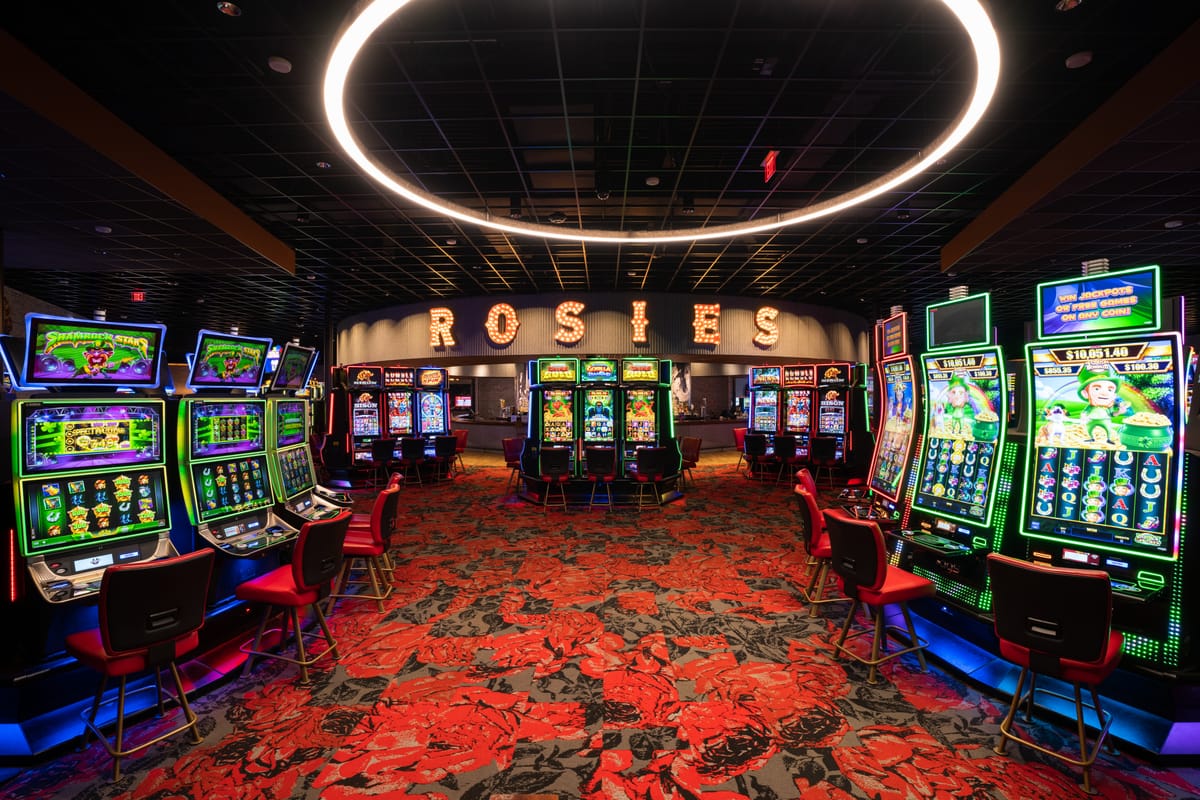
Richmond splits its Rosie's tax money with New Kent County. Legislators want to change that.
For every dollar of local tax revenue generated from the slots-like gambling machines at the Rosie’s Gaming Emporium in South Richmond, only 50 cents goes to the city of Richmond.
The other 50 cents goes to New Kent County, the rural but rapidly growing area east of Richmond that hosts Colonial Downs, Virginia’s premier horse racing track.
In the most recent budget year, that meant the Richmond Rosie’s — currently the most profitable of six off-track gambling facilities in Virginia — generated $3.7 million for Richmond, and $3.7 million for New Kent.
Because that money is coming from slot machine lookalikes that have only a tangential connection to real-life horse racing, some state legislators are questioning whether the even split is fair.
A General Assembly work group is exploring changes to the law that could cause more Rosie’s tax revenue to stay in Richmond. That study — which could lead to legislation in the 2025 session — is set to be wrapped up next week. And the influential lawmaker leading the review recently told New Kent officials they should be ready for things to change.
“I’ve been getting a lot of heat from my district,” House Appropriations Committee Chairman Luke Torian, D-Prince William, said at a Sept. 17 legislative hearing. “Why do we have to continue to give New Kent County half of the revenues that we are generating?”
Torian’s Northern Virginia district includes the town of Dumfries, which already has a Rosie’s and will soon host The Rose, a casino-like resort that would be the largest satellite facility yet and generate far more revenue than the Richmond Rosie’s. The Rose will have more than 1,600 HHR machines, more than double the roughly 750 machines in Richmond.
The Richmond Rosie’s has generated about $29 million in local tax revenue since 2020, according to state data, with half going to the city and half going to New Kent.

Several Richmond representatives are supporting the push to get Richmond and other localities something better than a 50-50 split.
State Sen. Lamont Bagby, D-Richmond, said he’s not a fan of seeing gambling facilities in majority-Black areas helping to fund New Kent’s growth instead of primarily generating money for the communities where they were built.
“It is crucial that we immediately change that formula,” Bagby, who chairs the Virginia Legislative Black Caucus, told The Richmonder.
Bagby said he expects to see bipartisan support for the idea. Only the General Assembly members who represent New Kent, he said, have a reason to oppose it.
Del. Michael Jones, D-Richmond, whose district include's the Rosie's and served on the City Council when the facility was approved, said Richmond should get "every dime" of the local revenue.
"It's Richmond citizens. It’s Richmond metro folk," he said of the Richmond Rosie's clientele. "So we should reap the entire benefit of that tax revenue.”
The Rosie’s in the city of Hampton was second behind Richmond in dollars generated for New Kent at a little less than $3 million per year. The other Rosie’s locations are in the town of Vinton in Southwest Virginia, and the city of Emporia and Henry County in Southside Virginia.
A Richmond spokeswoman indicated the city is taking a wait-and-see approach to the state’s review.
“At this moment, we will wait on the work group’s findings and recommendations, however, we will certainly support any proposal that results in an increase in revenue for the city,” said city spokeswoman Margaret Ekam.
Why the split exists
The revenue-sharing arrangement with New Kent dates back to when Virginia’s off-track betting parlors were smaller facilities where patrons could gamble on live horse races happening at Colonial Downs. The idea at the time was that because those satellite facilities wouldn’t exist without the races being held at Colonial Downs, the off-track betting sites should help pay for the infrastructure and personnel New Kent had to have in order to be a horse racing destination.
But live races aren’t the big moneymaker anymore. Virginia’s newer and bigger Rosie’s facilities mainly feature “historic horse racing machines,” which look and feel like traditional slot machines but are powered by an archive of past horse races.
According to a state analysis presented to General Assembly members, New Kent is making more money from Richmond’s HHR machines than it makes from the machines at its own race track. In fiscal year 2024, New Kent took in $3.1M from machines at the track, less than the $3.7M it got from the Richmond machines.
According to data for fiscal 2024, more than 75% of the $12.8 million New Kent received in HHR revenue came from satellite facilities outside New Kent.
The total amount of money wagered on HHR machines now dwarfs the dollars bet on live racing. In 2023, more than $4 billion was wagered on the machines, according to Virginia Racing Commission data, compared with about $72 million wagered on live thoroughbred racing.
The number of HHR machines allowed statewide is tied to the number of live racing days held at Colonial Downs in order to ensure traditional horse racing endures and prevent the industry from becoming solely focused on the far more lucrative gambling machines. To install more machines, Churchill Downs — the owner of both Rosie’s and Colonial Downs — has to add more racing days at the track.
New Kent makes money from HHR machines all year, and Rosie’s facilities operate at all hours regardless of when live races are happening. This year, the 27-day live racing schedule at Colonial Downs ran across nine weeks from July to September.
New Kent’s defense
At the recent hearing, New Kent County Administrator Rodney Hathaway urged lawmakers not to discount his county’s central role in Virginia horse racing and its former struggles when Colonial Downs was shuttered from 2014 to 2019. The county made a bet on horse racing decades ago, Hathaway said, and it’s just now “paying off.”
“We recognize that your work could result in a change in New Kent County,” Hathaway told the General Assembly work group. “But we hope that in doing so you will keep in mind both the history and the ongoing role that New Kent plays in the overall ecosystem that makes horse racing and historic horse racing possible.”
The HHR money, Hathaway said, has helped New Kent pay for new fire stations, water and transportation infrastructure projects, more public safety personnel and initiatives to increase broadband access in the county. The funding helps alleviate the strain on county resources, he added on race days when ambulances, first responders and law enforcement are assigned to the track, even though some of that cost is borne by Colonial Downs and its owner Churchill Downs.
“I can tell you, from our experience, it is a lot easier to host a satellite facility than to host a race track,” Hathaway said.
Under friendly questioning from Sen. Ryan McDougle, R-Hanover, Hathaway pointed out his county had recently raised its real estate tax rate by two cents, setting a new rate of 59 cents per $100 of assessed value. McDougle’s Senate district includes New Kent.
That prompted Torian to point out that, because New Kent has rolled back its real estate tax rate in response to rising property assessments, the county’s current tax rate is still below the 79-cent rate it had in 2021.
If New Kent needed more revenue to keep up with its growing population and infrastructure needs, Torian said, it could’ve collected more from its own tax base.
“I can assure you that there will be a change,” Torian said. “And New Kent needs to be prepared for that. OK?”
This story was updated after publication to include comments from Del. Michael Jones.






